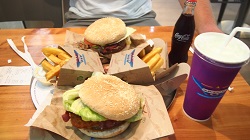 When we think “addiction,” we automatically think drugs. However, addiction can apply to just about anything, including junk food. Few would argue that the U.S. and, increasingly, the world, isn’t struggling with an obesity epidemic. Obesity was just added as an official disease in recent years, and although there are many factors that play into obesity, junk food addiction and abuse is certainly one of them.
When we think “addiction,” we automatically think drugs. However, addiction can apply to just about anything, including junk food. Few would argue that the U.S. and, increasingly, the world, isn’t struggling with an obesity epidemic. Obesity was just added as an official disease in recent years, and although there are many factors that play into obesity, junk food addiction and abuse is certainly one of them.
Why does our body crave junk when it makes sense that it should crave good, healthy food? What we like to call cravings might actually be a full-fledged addiction. However, since junk food isn’t illegal, we rarely think of it as a dangerous substance akin to a “drug.”
Related reading: What Do Your Crazy Food Cravings Tell You?
A “craving” happens when the brain requests a certain food—or, more specifically, an ingredient that’s heavily doused within certain foods. We understand that candy bars, or refined sugar, isn’t healthy for us in large doses, so why doesn’t that seem to be reflected in our brains? As it turns out, the various parts of the brain don’t necessarily agree with one another, especially when junk food addiction is present. In some cases, detoxing from sugar and other junk foods is similar to detoxing from stimulants.
Related reading: Sugar Detox – Supercharge Your Health In 5 Simple Steps
That’s why some people seem like they can take or leave sugar, while other are deep in their substance abuse. If you find yourself repeatedly reaching for food that you know isn’t healthy but you can’t seem to control it, you might have a junk food addiction and you’re not alone. In a massive study of nearly 30,000 young people, the vast majority who discussed junk food addiction in online chat rooms used language eerily similar to people discussing drug addiction from their inability to control their binges to withdrawal symptoms.
Will Power
Genuine addiction is no match for will power. Being addicted to junk food is giving your brain a reward, just like if you were addicted to a hard drug. Eating these foods can lead to a full addiction, and the biological foundation is nearly identical to drug addiction. Our brain’s reward system exists to cheer us on when we do something that helps our survival instincts. Eating is, of course, a big part of survival. However, some of our reward systems go above and beyond the call of duty.
Our brain often considers eating, no matter what it is, as a means of survival. To encourage more eating, especially of high calorie foods, the brain releases dopamine—the feel-good chemical that helps making eating so pleasurable. We’re hardwired to chase dopamine, and for many of us that means over-indulging on junk food. After all, if we were trying to survive in the wild, we’d be after pure calories for energy. Simply put, a candy bar packs a much bigger caloric punch than an apple. Our brains don’t understand that most of us are no longer struggling just to eat. It takes centuries for our brains to catch up to reality.
The higher the calories and sheer energy suppliers like sugar, the more dopamine our brain releases.
Upping the Ante
Also just like drug addiction, we have a knack for building up a tolerance to junk foods. We need more to get the same results (or the same level of dopamine rush). Over time, dopamine receptors begin to down-regulate. When too much dopamine is released, the brain releases receptors to balance things out. This feeds a vicious cycle of needing more dopamine to tackle those receptors, and even more receptors for that increase in dopamine. The result? You crave more junk food.
When addicts try to quit their drug of choice, including junk food, less dopamine and dopamine receptors are released. A lack of dopamine activity leads to feelings of unhappiness and even physical pain and discomfort. You’re not getting the “fix” you’re after, and your body goes into withdrawal. Physical withdrawal symptoms can vary person to person, and can include changes in thoughts and behaviors.
Related reading: How Drugs Damage Your Liver
Seeking professional help for any type of addiction can be a great help. It’s very challenging, difficult and potentially dangerous to “quit” an addiction on your own. Remember that cravings are often mistaken for addiction. It’s an emotional state that isn’t akin to hunger. Genuine hunger is your body’s healthy way of telling you to consume food—ideally healthy, balanced food.
An increasing issue with junk food addiction is the onslaught of chemicals and preservatives (in addition to sugar, salt, fat and other addictive ingredients in food). Chemicals in food can cause brain and body activity to go haywire and, unfortunately, we’re not even close to understanding the full impact of packing our foods with chemicals.
Author bio: Trevor is a freelance writer and recovering addict & alcoholic who’s been clean and sober for over 5 years. Since his recovery began he has enjoyed using his talent for words to help spread treatment resources and addiction awareness. In his free time, you can find him working with recovering addicts or outside enjoying about any type of fitness activity imaginable.



